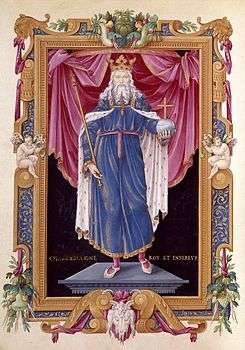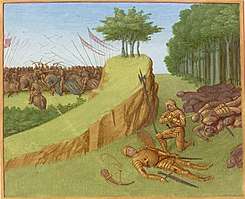The Song of Roland or La Chanson de Roland, the earliest surviving masterpiece of French literature, is an epic poem written in Old French which reached its final form in or around the later 11th century. It centres on the death of Charlemagne's nephew Roland at the battle of Roncevaux. Nothing is known of the author except that his name may have been Turoldus.
Quotes
- Quotations in the original Old French come from the edition by F. Whitehead: La Chanson de Roland (Oxford, 1946). Translations are taken from the version by Howard S. Robertson: The Song of Roland (London, 1972), ISBN 0460017772.

White is his beard and hoary is his head,
His stature noble and his countenance proud.
His stature noble and his countenance proud.
- Un faldestoed i unt fait tut d'or mer,
La siet li reis ki dulce France tient.
Blanche ad la barbe e tut flurit le chef,
Gent ad le cors e le cuntenant fier;
S'est k·il demandet, ne l'estoet enseigner.- Upon a faldstool wrought in purest gold
Sits Charlemagne, the king who rules all France.
White is his beard and hoary is his head,
His stature noble and his countenance proud –
No need to point him out to any man. - Stanza VIII, line 115.
- Upon a faldstool wrought in purest gold
- Dist Oliver: "Paien unt grant esforz,
De noz Franceis m'i semblet aveir mult poi.
Cumpaign Rollant, kar sunez vostre corn!
Si l'orrat Carles, si returnerat l'ost."
Respunt Rollant: "Jo fereie que fols,
En dulce France en perdreie mun los".
- Rollant est proz e Oliver est sage.
- Heroic Roland and wise Oliver.
- Stanza LXXXVII, line 1093
- Pur sun seignur deit hom susfrir granz mals
E endurer e forz freiz e granz chalz,
Si·n deit hom perdre del sanc e de la char.- A man should suffer greatly for his lord,
Endure both biting cold and sweltering heat
And sacrifice for him both flesh and blood. - Stanza LXXXVIII, line 1117
- A man should suffer greatly for his lord,
- Kar vasselage par sens nen est folie,
Mielz valt mesure que ne fait estultie.- For courage mixed with prudence is not foolish,
And moderation betters recklessness. - Stanza CXXXI, line 1724
- For courage mixed with prudence is not foolish,
- Rollant ad mis l'olifan a sa buche,
Empeint le ben, par grant vertut le sunet.
Halt sunt li pui e la voiz est mult lunge,
Granz ·xxx· liwes l’oïrent il respundre.
Karles l'oït e ses cumpaignes tutes.
Ço dit li reis: "Bataille funt nostre hume."- Count Roland lifts the horn up to his mouth,
Then sets his lips and blows it with great force.
The hills are high; the horn's voice loud and long;
They hear it echoing full thirty leagues.
King Charles and his companions hear it sound.
The king declares, "Our men are in a battle." - Stanza CXXXIII, line 1753
- Count Roland lifts the horn up to his mouth,

Brave French, I see you die on my account,
And I unable to protect your lives!
And I unable to protect your lives!
- Tere de France, mult estes dulz païs,
Oi desertét a tant ruboste exill!
Barons franceis, pur mei vos vei murir,
Jo ne vos pois tenser ne guarantir.- Oh land of France, oh blissful, pleasant land,
Today laid desolate by such cruel waste!
Brave French, I see you die on my account,
And I unable to protect your lives! - Stanza CXL, line 1861
- Oh land of France, oh blissful, pleasant land,
- Mult ad apris ki bien conuist ahan.
- He has learned much who knows the pain of struggle.
- Stanza CLXXXIV, line 2524
- "Deus," dist li reis, "si penuse est ma vie!"
Pluret des oilz, sa barbe blanche tiret.
Ci falt la geste que Turoldus declinet.- "God," says the king, "how wearisome my life!"
He weeps and pulls at his white beard.
Thus ends the poem that Turoldus declines. - Stanza CCXCVIII, line 4000
- "God," says the king, "how wearisome my life!"
About The Song of Roland
- Roland is ideal and universal, and the story of his defeat, of the blast of his horn, and the last stroke of Durendal is a kind of funeral march or "heroic symphony" into which a meaning may be read for every new hero, to the end of the world.
- W. P. Ker Epic and Romance (New York, 1957) p. 295.
- Tunc cantilena Rollandi inchoata, ut martium viri exemplum pugnaturos accenderet, inclamatoque Dei auxilio prelium consertum bellatumque acriter, neutris in multam diei horam cedentibus.
- Then the soldiers began the song of Roland so that the martial example of this man should excite them, and calling upon God's help, they began the fight and most bitter battle, with neither side yielding until late in the day.
- William of Malmesbury Gesta Regum Anglorum, Bk. 3, section 242; describing the Norman army at the Battle of Hastings; translation from John Haines Eight Centuries of Troubadours and Trouvères (Cambridge, 2004) p. 58.
External links



- The Song of Roland in the original Old French.
This article is issued from
Wikiquote.
The text is licensed under Creative
Commons - Attribution - Sharealike.
Additional terms may apply for the media files.